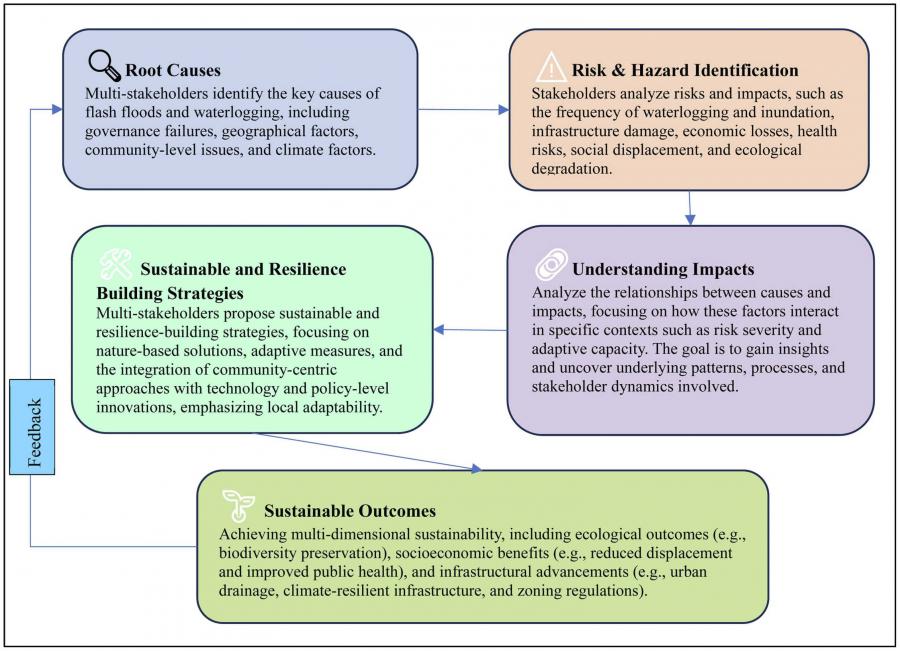
Multistakeholder Solutions for Urban Resilience for Coastal Cities
GA, UNITED STATES, April 27, 2025 /EINPresswire.com/ -- A groundbreaking study of Chittagong City exposes how governance gaps and infrastructure failures exacerbate urban flooding, proposing 10 key strategies combining engineering solutions with community engagement to build climate-resilient cities.
Rapid urbanization and climate change are intensifying urban flash floods and waterlogging, especially in coastal cities. In a new study published in Risk Sciences, a duo of researchers explore the growing challenges and offer practical solutions for building resilient and sustainable cities.
"In the face of accelerated urbanization and the growing frequency of extreme weather events, cities across the Global South are increasingly vulnerable to flash floods and waterlogging," explains co-author Z. R. M. Abdullah Kaiser. "Chittagong, the second-largest city in Bangladesh, is emblematic of this crisis. Its coastal location, combined with rapid and often unplanned urban expansion, aging infrastructure, poor drainage systems, and weak environmental governance, has made the city highly susceptible to seasonal urban flooding and water stagnation—disrupting lives, damaging infrastructure, and threatening long-term sustainability."
The study employs a qualitative case study approach based on 48 in-depth, semi-structured interviews with stakeholders from public, private, academic, and nonprofit sectors, complemented by direct field observations in key flood-prone zones. "Rather than relying on simulations or big data models, our research draws on lived experiences and institutional insights to explore the multifaceted causes, impacts, and possible solutions to recurring urban water crises," adds Abdullah Kaiser.
The key findings highlight the compounded role of governance failures, uncoordinated mega projects, inadequate waste management, destruction of natural water bodies, and climate-induced pressures such as rising sea levels and intense monsoon rainfall. The impacts are wide-ranging — spanning economic loss, traffic paralysis, public health concerns, ecological degradation, and the displacement of vulnerable urban populations.
"Our findings emphasize the need for an integrated, multi-stakeholder approach to urban flood resilience. Stakeholders proposed concrete actions including the implementation of Sustainable Urban Drainage Systems (SUDS), improved zoning and land-use planning, investment in green infrastructure, stronger legal frameworks for environmental protection, and inclusive urban governance," says Abdullah Kaiser. "Emphasis was also placed on environmental education, community engagement, and aligning local policies with the Sustainable Development Goals (SDGs), particularly SDG 11 (Sustainable Cities) and SDG 13 (Climate Action)."
This research contributes to the understanding of risk, resilience, and sustainability in coastal cities, offering actionable insights for policymakers, urban planners, and development agencies committed to transforming vulnerable urban areas into resilient, inclusive, and sustainable spaces.
References
DOI
10.1016/j.risk.2025.100011
Original Source URL
https://doi.org/10.1016/j.risk.2025.100011
Funding information
This work is supported by National Institute of Urban Affairs (NIUA-2022-GRANT-114)
Lucy Wang
BioDesign Research
email us here
Distribution channels: Environment, Natural Disasters
Legal Disclaimer:
EIN Presswire provides this news content "as is" without warranty of any kind. We do not accept any responsibility or liability for the accuracy, content, images, videos, licenses, completeness, legality, or reliability of the information contained in this article. If you have any complaints or copyright issues related to this article, kindly contact the author above.
Submit your press release
